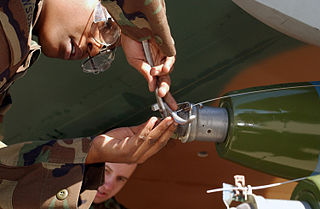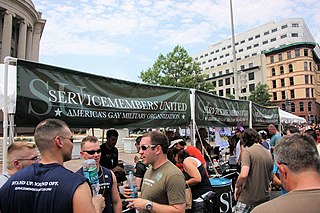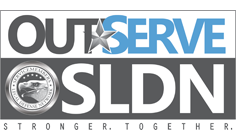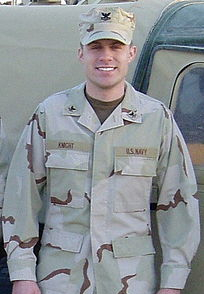Related Research Articles

"Don't ask, don't tell" (DADT) was the official United States policy on military service of non-heterosexual people, instituted during the Clinton administration. The policy was issued under Department of Defense Directive 1304.26 on December 21, 1993, and was in effect from February 28, 1994, until September 20, 2011. The policy prohibited military personnel from discriminating against or harassing closeted homosexual or bisexual service members or applicants, while barring openly gay, lesbian, or bisexual persons from military service. This relaxation of legal restrictions on service by gays and lesbians in the armed forces was mandated by Public Law 103–160, which was signed November 30, 1993. The policy prohibited people who "demonstrate a propensity or intent to engage in homosexual acts" from serving in the armed forces of the United States, because their presence "would create an unacceptable risk to the high standards of morale, good order and discipline, and unit cohesion that are the essence of military capability".

A military discharge is given when a member of the armed forces is released from their obligation to serve. Each country's military has different types of discharge. They are generally based on whether the persons completed their training and then fully and satisfactorily completed their term of service. Other types of discharge are based on factors such as the quality of their service, whether their service had to be ended prematurely due to humanitarian or medical reasons, whether they had been found to have drug or alcohol dependency issues and whether they were complying with treatment and counseling, and whether they had demerits or punishments for infractions or were convicted of any crimes. These factors affect whether they will be asked or allowed to re-enlist and whether they qualify for benefits after their discharge.
The DD Form 214, Certificate of Release or Discharge from Active Duty, generally referred to as a "DD 214", is a document of the United States Department of Defense, issued upon a military service member's retirement, separation, or discharge from active duty in the Armed Forces of the United States.

McVeigh v. Cohen was a 1998 lawsuit in U.S. federal court in which a member of the U.S. Armed Forces challenged the military's application of its "Don't Ask, Don't Tell" (DADT) policy, which established guidelines for service by gays and lesbians in the U.S. military. The U.S. Navy sought to discharge Timothy R. McVeigh for declaring his homosexuality, which he had allegedly done via anonymous Internet posts. McVeigh's suit denied he had made such a declaration and charged the Navy with failure to adhere to its own DADT policy and, in the course of investigating him, with violating the Electronic Communications Privacy Act by collecting his private online communications.
Darren Manzella was a United States Army Sergeant, Army medic and gay activist from Portland, New York, who was discharged under the Don't ask, don't tell policy. Manzella served in Iraq and Kuwait, and was stationed in Fort Hood, Texas.
The United States Navy dog handler hazing scandal was a pattern of misconduct engaged in by members of the United States Navy at Naval Support Activity Bahrain between 2004 and 2006. Naval investigators documented nearly 100 incidents of abuse committed against several members of a Military Working Dog (MWD) unit stationed at the United States military base at Juffair. Documented incidents of abuse include racial intimidation, sexual harassment, physical abuse and anti-gay harassment. One sailor, Master-At-Arms 3rd Class Joseph Rocha, suffered post-traumatic stress disorder because of his abuse at the hands of fellow sailors, and he alleges that another sailor committed suicide because of her treatment. The Navy investigated the allegations in 2007 and documented the abuse, but took little substantive action. However, Pennsylvania Congressman Joe Sestak, a former Vice Admiral, demanded a new examination of the report's findings which led to the disciplining of Rocha's former superior, Chief Petty Officer Michael Toussaint. The scandal came to widespread public attention as United States President Barack Obama faced increased pressure to repeal the military's gay-exclusionary policy known as "don't ask, don't tell" (DADT).
The United States military formerly excluded gay men, bisexuals, and lesbians from service. In 1993, the United States Congress passed, and President Bill Clinton signed a law instituting the policy commonly referred to as "Don't ask, don't tell" (DADT) which allowed gay, lesbian, and bisexual people to serve as long as they did not reveal their sexual orientation. Although there were isolated instances in which service personnel were met with limited success through lawsuits, efforts to end the ban on openly gay, lesbian, and bisexual people serving either legislatively, or through the courts initially proved unsuccessful.

Jene Newsome was a United States Air Force sergeant who was honorably discharged after 9 years of service under the "Don't ask, don't tell" policy. She was outed by the Rapid City Police Department on November 24, 2009, after they saw an Iowa marriage license on her kitchen table. This raised questions about third party outings under the military's "Don't Ask, Don't Tell" policy.

Log Cabin Republicans v. United States, 658 F.3d 1162 was a federal lawsuit challenging the constitutionality of 10 U.S.C. § 654, commonly known as don't ask, don't tell (DADT), which, prior to its repeal, excluded homosexuals from openly serving in the United States military. The Log Cabin Republicans (LCR), an organization composed of lesbian, gay, bisexual, and transgender (LGBT) Republicans, brought the suit on behalf of LCR members who serve or served in the military and were subject to DADT.

Servicemembers United (SU) was an LGBT-interest organization dedicated to the repeal of the United States armed forces' gay-exclusionary policy, commonly known as "don't ask, don't tell" (DADT). The organization, formerly known as "Call to Duty", formed in 2005 by veterans.

Witt v. Department of the Air Force, 527 F.3d 806 is a federal lawsuit that challenged the constitutionality of 10 U.S.C. § 654, the law, since repealed, that excluded openly homosexual people from serving in the United States military, commonly known as "Don't ask, don't tell" (DADT). The United States Court of Appeals for the Ninth Circuit ruled in 2008 that under Lawrence v. Texas DADT constitutes an "[attempt] to intrude upon the personal and private lives of homosexuals" and it is subject to "heightened scrutiny", meaning that the government "must advance an important governmental interest, the intrusion must significantly further that interest, and the intrusion must be necessary to further that interest."
Stephen Timothy May is an American politician who served in the Arizona House of Representatives. He was openly gay when he ran for and served in the legislature. He was nevertheless recalled to active duty in the military. He came to national attention in 1999 when the U.S. Army attempted to discharge him from the United States Army Reserve under the gay-exclusionary law known as "don't ask, don't tell" (DADT).

The Don't Ask, Don't Tell Repeal Act of 2010 is a landmark United States federal statute enacted in December 2010 that established a process for ending the "don't ask, don't tell" (DADT) policy, thus allowing gay, lesbian, and bisexual people to serve openly in the United States Armed Forces. It ended the policy in place since 1993 that allowed them to serve only if they kept their sexual orientation secret and the military did not learn of their sexual orientation, which was controversial.

OutServe-SLDN was a network of LGBT military personnel, formed as a result of the merger between OutServe and the Servicemembers Legal Defense Network. OutServe-SLDN was one of the largest LGBT employee resource groups in the world. OutServe was founded by a 2009 graduate of the US Air Force Academy, Josh Seefried and Ty Walrod. There were over 7,000 members and 80 chapters worldwide.
Josh Seefried is an LGBT rights activist, a former captain in the United States Air Force, and a former co-chairman on the Board of Directors of OutServe-SLDN, an association of lesbian, gay, bisexual and transgender members of the U.S. Military. A graduate from the U.S. Air Force Academy in 2009, Josh was formerly known by his pseudonym JD Smith during his campaign to end the discrimination against lesbians, gays and bisexuals serving openly in the United States military.

Maria Zoe Dunning is a U.S. Naval Academy graduate and gay rights activist. She is known for being the only openly gay person remaining on active duty in the U.S. military after coming out. She was involved in a series of lawsuits against the U.S. military and the Don't Ask, Don't Tell policy during the 1990s.

Dan Choi is an American former infantry officer in the United States Army who served in combat in the Iraq War during 2006–2007. He became an LGBT rights activist following his coming out on The Rachel Maddow Show in March 2009 and publicly challenged America's Don't Ask, Don't Tell policy, which forbade lesbian, gay and bisexual (LGB) service members from serving openly.

Jase Daniels is a United States Navy linguist who was discharged from the military twice under the policy known as "Don't Ask, Don't Tell" (DADT). Daniels served from 2001 to 2005 and again from 2006 to 2007. After coming out in Stars and Stripes, a newspaper published under the sponsorship of the U.S. Department of Defense, Daniels challenged the Don't Ask, Don't Tell policy that forbade gay and lesbian service members from serving openly. His case attracted attention in such major U.S. media outlets as Newsweek and the New York Times. Daniels returned to active duty in the United States Navy on December 12, 2011, and is believed to be one of the first servicemembers, and perhaps the first, to return to active duty following the end of restrictions on service by openly gay and lesbian servicemembers in the U.S. Armed Forces.
Keith Meinhold is an American former military officer. He is a veteran of the US Navy who successfully challenged the Navy's attempt to discharge him for coming out as gay in 1992 and ended his Navy career in 1996, one of the first openly gay U.S. service members to be honorably discharged.
Joan Darrah is an activist for LGBT rights, specifically the end of the "don't ask don't tell" (DADT) policy, which prohibited gay, lesbian, and bisexual service members from being open about their sexual orientation.
References
- ↑ "Collins v. United States - Class Action for Military Separation Pay". American Civil Liberties Union. November 10, 2010.
- ↑ "Defense Department Says It Will Deny Full Separation Pay For Gay And Lesbian Service Members Honorably Discharged Under "Don't Ask, Don't Tell"". American Civil Liberties Union. January 29, 2011.
- ↑ "Gov't opposes full severance pay for military gays". Associated Press via CBS News. September 22, 2011.
- ↑ Geidner, Chris (January 7, 2013). "Servicemembers Kicked Out Under Military's Gay Ban Since '04 To Receive Full Separation Pay". Buzz Feed. Retrieved January 7, 2013.
- ↑ Muñoz, Carlo (January 7, 2013). "'Don't ask, don't tell' dischargees to receive full back pay from DOD". The Hill. Retrieved January 7, 2013.